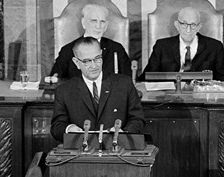 Today is the 50th anniversary of the War on Poverty.
Today is the 50th anniversary of the War on Poverty.
On January 8, 1964, Lyndon Johnson, in his State of the Union address to Congress, dramatically announced:
This administration today, here and now, declares unconditional war on poverty in America.
On this occasion, I think it is worth remembering that Johnson was intimately familiar with poverty, having had what biographer Robert Caro calls a “terrible boyhood” filled with the insecurity and humiliations of poverty: living in a home that could be taken by the bank at any time, and often depending on neighbors to bring dishes of food to eat. This seems to have filled Johnson with a passion to fight poverty, which he began planning with his advisers within hours of the assassination of President Kennedy.1
Perhaps because of his familiarity with poverty, Johnson did not attribute poverty to failures on the part of the poor:
The cause may lie deeper in our failure to give our fellow citizens a fair chance to develop their own capacities, in a lack of education and training, in a lack of medical care and housing, in a lack of decent communities in which to live and bring up their children.
This analysis does not speak directly to the issue of race. But we should pause to remember that one legacy of slavery and racial discrimination was, and remains, a disproportionate lack of access to education, training, medical care and housing, and to decent communities with sound infrastructure and opportunities.
Johnson was not unaware of the disproportionate burdens often faced by non-white Americans, in particular, in seeking to rise above poverty. And he understood the importance of including policies aimed explicitly at issues of race in the war on poverty:
Let me make one principle of this administration abundantly clear: All of these increased opportunities–in employment, in education, in housing, and in every field–must be open to Americans of every color.
As far as the writ of Federal law will run, we must abolish not some, but all racial discrimination. For this is not merely an economic issue, or a social, political, or international issue. It is a moral issue.
All members of the public should have equal access to facilities open to the public. All members of the public should be equally eligible for Federal benefits that are financed by the public. All members of the public should have an equal chance to vote for public officials and to send their children to good public schools and to contribute their talents to the public good.
While Johnson’s call for equal access to public facilities, and equal access to government benefits, may seem (mostly) outdated today, these rights were still largely unsecured in 1964 and would become a vital part of the achievements of civil rights era.
Meanwhile, other parts of the president’s vision for racial justice, including voting rights, and equal access to education and employment opportunities, are very much a part of today’s struggle for racial justice. As Johnson noted about the war on poverty in this same speech,
It will not be a short or easy struggle, no single weapon or strategy will suffice, but we shall not rest until that war is won. The richest Nation on earth can afford to win it. We cannot afford to lose it.
- See Robert A. Caro, Passage of Power: The Years of Lyndon Johnson (Alfred A. Knopf, 2012).
















